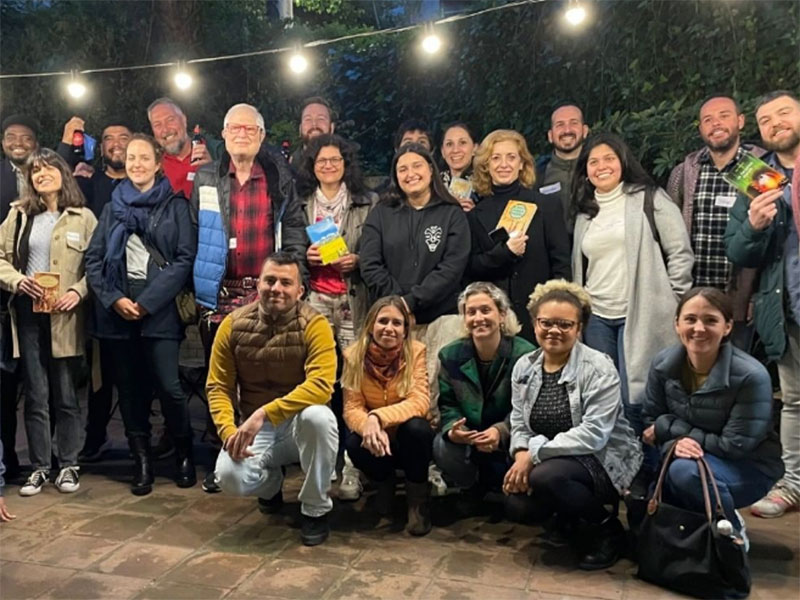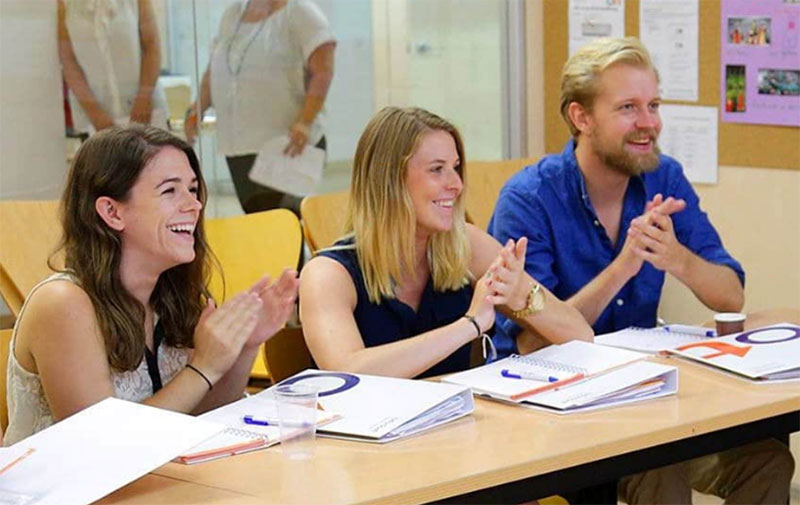If you’re new in Barcelona or considering making the move, you surely have a to-do list. Making friends, finding a flat, opening a bank account – these are all key to making a success of your new life in sunny Spain. Certainly as important, though, is getting a decent grasp on the Spanish language. If your own level is more cinco cervezas than Cervantes, you might well be looking for some tips to get you up to scratch. Especially in your early days in Barcelona, you’re probably looking to make financial savings where you can. While you may at some stage wish to consider paid Spanish lessons, there is a wide range of options to help you improve your Spanish without spending a céntimo. Read on for our top tips…
Tip 1: Consider learning the basics under your own steam
Cast an eye over the CEFR. This system of rating language ability runs from A1 (Beginner) to C2 (Proficient). Many people make good savings by reaching an A2 level through self-study. Perhaps you have already learnt some elementary grammar and vocabulary at school or through previous visits to the hispanosphere. Even if not, you can make use of apps such as Duolingo or Memrise and websites like Spanish Unlimited. There is also a wealth of material available through YouTube. Between A1 and A2 you can expect to learn basic vocabulary, verb conjugations, question formation, etc.
Do this yourself with the help of free online material, then you will be well-prepared for the next four tips. Of course this is not to say that you can’t continue to make use of the online resources you’ve discovered as you continue on your Spanish learning journey. Indeed, there are plenty of options to support you, right up until the C2 level.
Tip 2: Attend a language exchange event
Now able to introduce yourself and ask and answer some basic questions in Spanish? Sounds like you’re ready for Tip 2! Language exchange events are a fantastic way to put into practice the grammar and vocabulary you have picked up through self-study. Feeling nervous about this stage? Don’t! It’s important to remember that attendees at the event are all in the same boat as you. That is to say that they are language learners who want to practice their skills for free and meet new people in beautiful Barcelona.
Keep in mind too that not all exchange events are made equal. For instance, some will focus on a variety of languages. These typically involve wearing some kind of badge or lanyard with your mother tongue and language(s) you’d like to practise. Attendees then mingle with a drink and strike up conversations for a while before moving on. Other events include only English and Spanish, perhaps with Catalan too.
Yet another option is to attend an exchange event with a more specific activity. This can help to provide a focus for discussion and often takes away some of the initial awkwardness that can come along with attending your first language event. Oxford House, for instance, offers free events focused around quizzes, treasure hunts, cocktail classes and more – well worth a look if you’re looking to do something social as well as practising your skills.
If you’d like to sign up for a language exchange event, contact [email protected].
Naturally, if you get along well with a fellow attendee at any of these events, you can always exchange numbers and meet up outside of the session. This brings us on to…

A book swap language exchange event at Oxford House.
Tip 3: Find a Spanish exchange partner
This tip may sound similar to the previous one, and in some ways it is. The idea is that you find someone who is a native-level (or very strong) Spanish speaker and arrange to meet them regularly to ‘exchange’ conversation in English/ another language you speak well. Like the language exchange events mentioned above, it’s a great way to have an authentic conversation and put your skills to the test.
Unlike exchange events though, having a regular partner to exchange conversation with allows your language study to be more consistent and focused. Firstly, you’ll be meeting regularly, so your partner will begin to notice common errors or areas for improvement for you to work on. Secondly, it’s a chance to develop a closer relationship with someone. This can really help you to feel comfortable, especially if you haven’t studied a second language before. Thirdly, these sessions are more adaptable. For example, during your daily life, you may encounter a situation in which you have a question about your Spanish. You can then make a note of it to ask your conversation partner next time.

Language exchange partners often meet in bars and coffee shops.
Some language exchange partners decide to keep the conversation unstructured and informal. Others like to introduce more formalised aspects of grammar and vocabulary correction as the sessions go on. Whichever approach you choose, there is no doubt that finding a conversation partner can help you to come on in leaps and bounds. And if you make a few new friends in the process, then all the better!
Unsure how to meet your exchange partner? Try Tandem or Open Language Exchange!
Tip 4: Immerse yourself in Spanish
This option might feel quite daunting, but it doesn’t have to be as intimidating as it sounds. Strictly speaking, immersion learning involves putting yourself in a situation where you will only use Spanish. From shopping to socialising, working to writing – everything is done en castellano. As you establish yourself and your Spanish improves, this may feel more realistic. You will make local friends and feel more comfortable using your L2 (second language) for extended periods. Nevertheless, you can take steps towards this from the very first day. Start small at first – order a coffee, ask the cashier for a carrier bag. As time goes on, you can build up – go on a date, read the free newspaper. Before you know it, you’ll be dreaming in Spanish and as hooked on La casa de papel as everyone else!
Tip 5: Take a free Spanish course
Yes, this option might sound too good to be true, but we promise that it isn’t! There are schools in Barcelona which will offer free Spanish courses. Usually these will be taught by teachers-in-training and cover a very wide variety of grammar and vocabulary topics. Oxford House is a prime example. Their Certificate in Teaching Spanish as a Foreign Language trainees deliver free classes on a variety of part-time and intensive courses.
In fact, flexibility is key here. As well as having a large choice of days, times, and schedules, the courses can be taken online or in-person. If you pick the online option, you can connect from wherever you are and enjoy an engaging, well-structured class at your convenience. Face-to-face sessions take place at their bright, modern school in the centre of town. As you’ll see, the people who participate are from all walks of life and the classes are another brilliant opportunity to make some new friends. You can even get a (free) certificate of completion if you attend more than 80% of the sessions!
Another advantage is that these classes are more structured than any of the options mentioned above. They cover a very wide range of relevant grammar and vocabulary for your level, and provide a great opportunity to speak and be corrected. Yes, the teachers are still completing their training, but they are working under the guidance of highly experienced tutors. The lesson is planned and checked ahead of time, and the tutor will be present during the classes to ensure they are providing learners with what they need. If you need a bit more accountability and structure to your free Spanish instruction, these classes might well be the best option for you.
For more information about the free Spanish lessons from Oxford House and to sign up, contact [email protected] with your level and availability. You will then receive a reply informing you which classes are available. Include the promo code LUKEMTB and the course will be totally free. If you don’t know your level, you can check it here.

Attending a free class provides accountability and adds structure to your studies.
What else?
Hopefully by now you have seen that there is a wide range of options for anyone who is looking to improve their Spanish skills without spending a bomb. For most people, the key will be a combination of the tips provided above. Attend the occasional language event and sign up for a free Spanish class or meet your language exchange partner then go out for dinner with your new local friends. Whatever approach you choose, remember that learning a new language does take time. Don’t be discouraged by the inevitable setbacks, and be sure to celebrate the triumphs – ¡mucha suerte!


No comments yet.